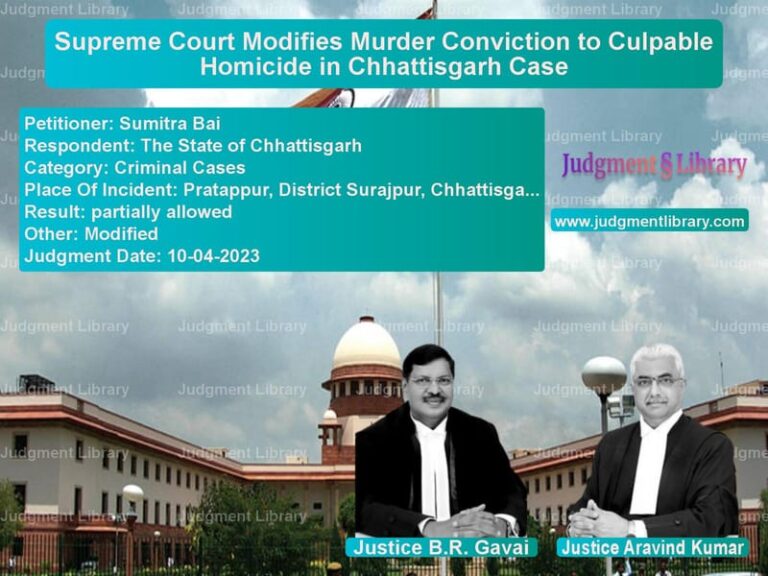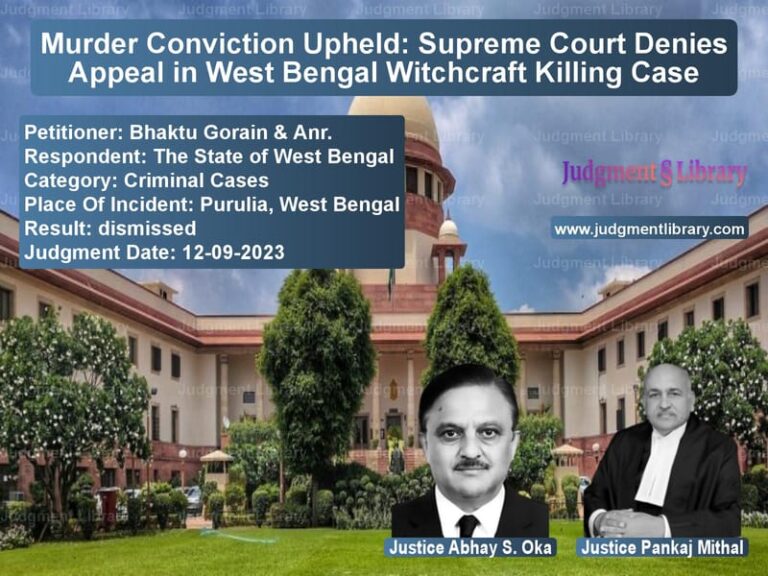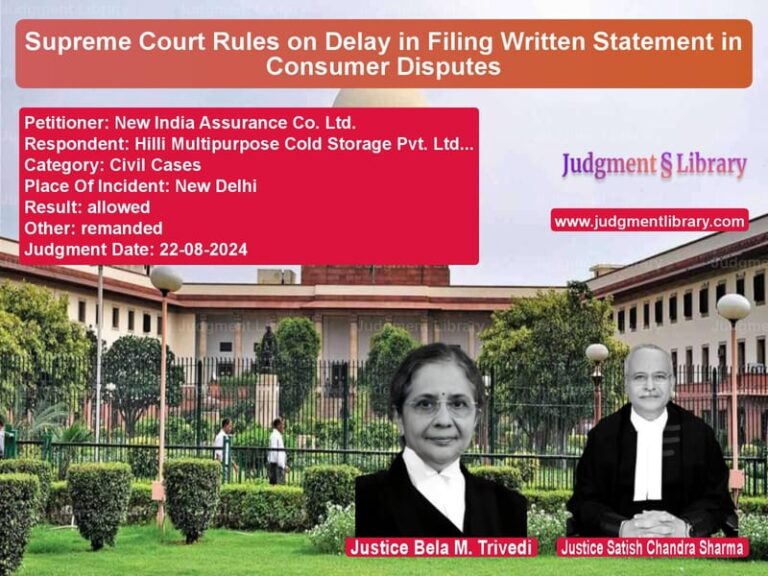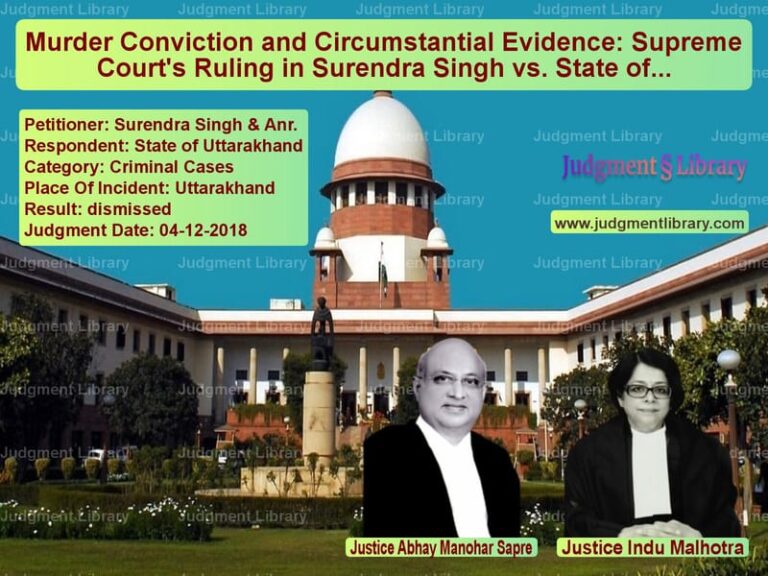Corruption and Money Laundering: Senthil Balaji Case and Supreme Court Ruling
The case of Y. Balaji vs. Karthik Desari & Anr. is a landmark ruling concerning corruption, job scams, and money laundering, involving the Tamil Nadu Transport Corporation and allegations against Minister Senthil Balaji. This case raises significant issues about the misuse of public office, procedural delays in investigation, and the role of enforcement agencies in combating corruption.
The case stems from allegations that a massive job-for-cash scam took place during the recruitment process for the Metropolitan Transport Corporation in Tamil Nadu in 2014. Several complaints were lodged against the accused, including public officials and intermediaries, alleging that bribes were taken in exchange for job appointments. However, the initial police investigations failed to include corruption charges under the Prevention of Corruption Act (PC Act), 1988. The Supreme Court had to intervene to ensure proper investigation and accountability.
Background of the Case
The matter started with recruitment advertisements issued in 2014 for various posts, including drivers, conductors, and junior engineers. Complaints later surfaced from unsuccessful candidates who alleged that they were forced to pay bribes but were not given jobs. Some of the main developments in the case include:
Read also: https://judgmentlibrary.com/life-imprisonment-upheld-in-gruesome-property-dispute-murder-case/
- In 2015, the first complaint was filed by Devasagayam, alleging that he paid ₹2.6 lakhs to an intermediary but did not receive the promised job.
- Additional complaints emerged in 2016 and 2017, with allegations that money was collected on behalf of Minister Senthil Balaji and his associates.
- Despite mounting evidence, the police filed charge sheets under sections 406 and 420 of the Indian Penal Code (IPC) but omitted corruption charges.
- In 2021, further investigations led to the Enforcement Directorate (ED) registering a money laundering case against the accused, citing violations under the Prevention of Money Laundering Act (PMLA), 2002.
Petitioners’ Arguments
The petitioners, including job aspirants and anti-corruption activists, argued:
- The police deliberately omitted sections of the Prevention of Corruption Act to shield powerful individuals, including Minister Senthil Balaji.
- Despite judicial directives, the investigation had been compromised, with key accused being let off.
- There was a clear case of money laundering as large sums of bribe money were collected and funneled into personal accounts.
- The Enforcement Directorate (ED) was well within its rights to investigate the financial trail left by the accused.
Respondents’ Arguments
The respondents, including the accused, countered:
- The allegations were politically motivated and lacked credible evidence.
- The inclusion of charges under the Prevention of Corruption Act was unwarranted since the original complaints did not name Minister Senthil Balaji.
- The Enforcement Directorate had no jurisdiction to investigate since no money laundering offense was explicitly proven.
- The investigation was prolonged unnecessarily and violated the accused’s rights.
Supreme Court’s Analysis
The Supreme Court analyzed multiple legal and procedural aspects, considering previous rulings on money laundering and corruption. Key points from the judgment include:
1. Inclusion of Corruption Charges
The Court observed:
“We are constrained to say that even a novice in criminal law would not have left the offenses under the PC Act out of the final report.”
Thus, the Court ruled that charges under the Prevention of Corruption Act must be included, as there was sufficient evidence that the job recruitment process was manipulated for monetary gain.
2. Money Laundering and Proceeds of Crime
The Court emphasized that illegal gratification received in exchange for job appointments qualifies as proceeds of crime under PMLA, making the case fit for ED intervention. The ruling clarified:
“Wherever there are allegations of corruption, there is acquisition of proceeds of crime, which itself tantamounts to money laundering.”
Thus, the ED was justified in initiating proceedings and summoning the accused.
3. Tampering of Evidence and Procedural Lapses
The Supreme Court noted that despite previous court orders, investigators failed to include relevant charges, indicating possible bias. The Court commented:
“The investigation and trial of a criminal case cannot be converted by the complainant and the accused into a friendly match.”
It also observed that attempts to delay and derail the investigation should not be entertained.
Final Verdict and Directions
The Supreme Court’s ruling had the following key conclusions:
- The investigation must proceed, including charges under the Prevention of Corruption Act.
- The Enforcement Directorate is allowed to continue its money laundering probe.
- The accused, including Minister Senthil Balaji, must cooperate with the investigation.
- The case cannot be dismissed based on technical objections or claims of political motivation.
- The authorities must ensure transparency in public sector recruitment to prevent future scams.
Implications of the Judgment
The ruling has major implications for anti-corruption enforcement in India:
- It sets a precedent for holding public officials accountable for recruitment-related bribery.
- It strengthens the role of the Enforcement Directorate in tracing illicit financial transactions linked to corruption.
- It underscores the need for strict oversight in public employment and recruitment processes.
- It signals that politically influential individuals cannot escape prosecution through procedural loopholes.
By ensuring that corruption-related offenses are thoroughly investigated and prosecuted, the judgment sends a strong message against abuse of power for personal gain. The ruling paves the way for improved governance and greater accountability in public administration.
Read also: https://judgmentlibrary.com/supreme-court-grants-probation-in-gambling-conviction-case/
Petitioner Name: Y. Balaji.Respondent Name: Karthik Desari & Anr..Judgment By: Justice V. Ramasubramanian, Justice Krishna Murari.Place Of Incident: Tamil Nadu, India.Judgment Date: 16-05-2023.
Don’t miss out on the full details! Download the complete judgment in PDF format below and gain valuable insights instantly!
Download Judgment: y.-balaji-vs-karthik-desari-&-anr-supreme-court-of-india-judgment-dated-16-05-2023.pdf
Directly Download Judgment: Directly download this Judgment
See all petitions in Money Laundering Cases
See all petitions in Fraud and Forgery
See all petitions in Public Sector Employees
See all petitions in Judgment by V. Ramasubramanian
See all petitions in Judgment by Krishna Murari
See all petitions in partially allowed
See all petitions in Remanded
See all petitions in supreme court of India judgments May 2023
See all petitions in 2023 judgments
See all posts in Criminal Cases Category
See all allowed petitions in Criminal Cases Category
See all Dismissed petitions in Criminal Cases Category
See all partially allowed petitions in Criminal Cases Category







